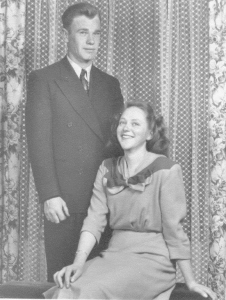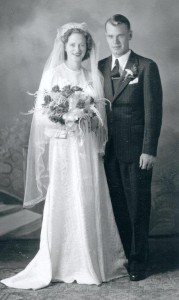 This post is part of a new series of biography writing by students in Joel Warkentin’s Religious Studies class at UMEI Christian High School in Leamington, Ontario. Look for a new biography every Monday morning or view the entire series here.
This post is part of a new series of biography writing by students in Joel Warkentin’s Religious Studies class at UMEI Christian High School in Leamington, Ontario. Look for a new biography every Monday morning or view the entire series here.
Biography of Sally Dyck
January 2016
by C. Enns, student biographer
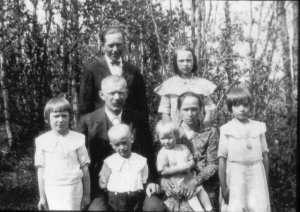
Sara Dyck (nee Froese) was born on April 9, 1930 in Halkirk, Alberta. She was the youngest in her family and the eleventh child born to Dietrich and Maria Froese. However, of the eleven children, five passed away between 1909 and 1920, before Sara was born. The siblings Sara grew up with were Diedrich, Susy, Mary, Margaret and Henry. Her oldest brother Diedrich was my grandma’s father.
Sara was born in Alberta and her brother Henry was born in Saskatchewan, but the rest of her family was born in Russia. Since the family was able to sell their farm in Siberia, they were able to buy a farm in Canada and could start out their life in Canada debt-free.
During the Depression, they lost one of their first crops due to army worms and had to start from scratch. Life in Alberta was terrible, as they had no money due to the Depression. Sara, having only been born in 1930, knew nothing about this, of course.
One of Sara’s only memories was that when the Rawleigh man came, they got pudding. The Rawleigh man was a man who went from house to house selling items such as soap, vanilla, and pudding extract. He was also Sara’s family’s way of getting news about what was going on in the outside world.
On their farm, they raised cows and chickens. Sara’s mother would go to the store with her butter and eggs, sell them, and then buy sugar and flour. Everyone knew her mother, because she was the little lady with the black hair and the white horse. While they didn’t have a lot of money, they were alright and made do.
Growing up, they didn’t have a lot of time for playing. Sara had to bring in the cows with her sister Mary. During this time, Mary would tell Sara all about Jesus, while their dog, Poodle, did all the work. After bringing in the cows, Poodle would chase the gophers. If he caught one, he brought it to Mary and she would take off the tail. Gophers were a problem, as there were too many of them, so for every 100 tails collected, the Alberta government would pay them one dollar.
For Christmas one year, Sara received a doll from her mother. Her mother had stopped at the dump and she picked up a doll’s head and made it into a doll for her as a present. Sara named her Rosalie. By the time they moved to Ontario, she had seven dolls, however, she was only allowed to bring three with her.
The weather in Alberta was severe. One night, her father was caught in a blizzard when he was bringing home coal in a wagon. He crawled underneath the tarp which was covering the coal and the horses brought him home across the field.
Sara’s favourite memory was when her minister died. He had a long white beard and white hair and her father told her that he was going to Heaven. She thought he was an angel and she wanted to die too so she could become an angel like him.
Sara didn’t remember any Sunday School classes in Alberta, but she remembered a story she had been told. Her dad was a Sunday School teacher and was also in charge of leading the singing. Her dad couldn’t sing, so her mother taught her to sing “Rock of Ages” in German when she was five. When her dad nodded at her, she would sing and she was the song leader. While her dad couldn’t sing, her mom could play the accordion and all the sisters loved to sing together.
In 1938, when Sara was eight, their family moved to Ontario. There were few Mennonite families where they were living, and her sisters were looking for husbands and wanted to remain Mennonite, so they decided to move to a Mennonite community.
They left Poodle with their friends and left in November. Their friends later said he ran away and they believed he wanted to return to their farm.
Growing up, they never had the money to travel, and their journey from Alberta to Ontario was the only trip Sara went on with her family. Sara’s oldest brother, Diedrich, wasn’t with them when they left Alberta, because he was working up in northern Ontario, cutting wood in the bush.
A friend of the family took them by horse and buggy to Regina, Saskatchewan, where they then took a passenger train to Windsor. From Windsor, they took a freight train to Kingsville and sat in the caboose.
In Kingsville, they lived with their friends, the Peters, who had moved from Alberta the year before, in their apartment. Their mom kept telling them to behave, because the Peters didn’t have any kids, but Mr. Peters was so nice, they couldn’t help but behave.
After living with the Peters for two weeks, they moved into a house in Albertville and went to Albertville school. Her family attended the church on Oak Street in Leamington, and every Saturday morning, someone would pick her up in Albertville and drive her to Leamington to go to German school at church.
One night in Albertville, Sara was home with her siblings, but her parents were out. A drunk man knocked on their door and they let him in, because in Alberta, that’s just what they did. He wanted to warm up so he turned the gas stove up so high, they thought he was going to burn the house down.
After that, their mother gave them strict instructions not to let anyone else in the house when they were home alone. However, another night when they were home alone, a man knocked on the door. They all ran and hid but when he kept knocking, they realized the man who was knocking was their older brother, Diedrich, who had come home.
After their house in Albertville, they moved to a house on the eighth concession and went to Albuna School on the ninth. Sara had gone to school in Alberta up to grade three, but the schools were much farther advanced in Alberta than in Ontario, so Sara was able to skip grade four and enter grade five.
While living on the eighth, Sara picked strawberries for Mr. Krueger. She didn’t enjoy picking strawberries, but she had no choice because all of her siblings were going. One day, Sara said that she had a stomach ache, so she couldn’t pick strawberries. Her mother wouldn’t let her stay at home by herself and made her come along. Sara sat under a tree while everyone else picked strawberries, but she found it very boring and ended up going out to the field to help pick.
Mr. Krueger thought this was very funny, and for years after, whenever he saw her he would ask, “Deit die noch emma de buck so wee?” (“Does your stomach still hurt so bad?”)
In 1941, her family moved into a house at 22 Hodgins Street. They had a two acre farm with chickens, a cow, apple trees, a plum tree, and raspberries. Sara and her siblings had to pick raspberries, and her mother was always the fastest. At 11:50 each morning, she would go inside to make dinner, and when the children all came in to wash their hands and eat, the raspberry warenike were ready.
Sara also had the job of planting tomato seedlings on the farm on Hodgins Street. It was her favourite job, and she was paid according to how many she planted.
While living on Hodgins Street, Sara had her first paying job working for Martin Woelk, her sister Susy’s husband. She had to “drive boat” which meant she would bring tobacco from the field to the kiln. She was paid $1.50 a day and could keep a fifth of that.
Sara attended Ridge School and in March of 1941, one of her sisters came home with the measles. Sara had to stay home from school for two weeks to avoid spreading it around to other children at school. However, after those two weeks, Sara caught the measles and was sick for two weeks. She was lying in bed feeling sorry for herself when her dad asked her, “Best du reid too stoove? Are you ready to die?” and she turned around and asked Jesus into her heart. Then Sara was saved and ready to die.
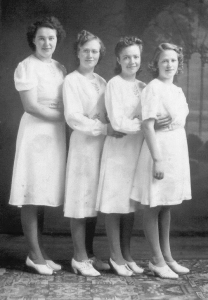
On her first day back to school, Sara was walking to school and all the kids were riding on their bikes cheering. The school had burnt down and Sara had to wait for another two weeks until they found room in other schools to place all the students from Ridge School. Sara went to Selkirk School with the other grades 5s and 6s from Ridge School.
Sara started high school at Leamington District Secondary School in September of 1943. Her sister, Margaret, started with her. Margaret was blind so Sara would take the notes for her, but Margaret was always smarter than her. The only class Sara could beat her in was French. When she started high school, Sara changed her name from Sara to Sally, after she was teased for her name in elementary school.
Sally’s favourite subjects were French and Math, but she didn’t like English or History. Their high school had four houses, Alpha, Beta, Delta, and Gamma, and she and Margaret were both Gammas. They didn’t play sports, but loved to watch them and cheer. Margaret returned to school later and completed grade thirteen, but Sally didn’t.
After high school, Sally worked at Cantor’s grocery store in Leamington, where she had to take the 100 pound bags of sugar and repackage them into smaller brown bags of five pounds and ten pounds each. She didn’t hate the job, but she preferred farming and only worked there until the spring.
Once Sally quit her job at the grocery store, she began working for Mr. Tiessen. She was supposed to be tying tobacco, but since they didn’t have very much, they shared the work with the Dicks. They spent three days at the Tiessens and three days at the Dicks.
On her first day at the Tiessens, there was a man named Henry Dyck working there who was really handsome, and Sally fell in love with him immediately. His grandma had come to visit from Saskatchewan one day, and while Sally was working, his mother and his grandmother came to work and stared at her. It wasn’t until later that her mother-in-law told her that his grandma had said “Why can’t we go see this Sally that Henry’s always talking about?”
In 1948, she and Henry got married. Sally didn’t remember much about the wedding, other than walking down the aisle and saying “yes.”
Sally was eighteen when she was married and she and Henry lived in a barn that they fixed up until the spring of 1949. The barn belonged to Mr. Pulford and they lived with the cows beneath them and the chickens beside them.
In the spring of 1949, she and Henry had a farm of their own. Her in-laws had bought a farm on the seventh concession, and she and Henry rented their farm on the fourth, which cost $500 a year. Sally was able to pay the rent with the money she earned from selling the asparagus she cut that grew on the farm. Four of their children, Henry, Susanne, Peter and Paul were born in the house on the fourth.
They lived on that farm until November 1956. In 1956, they moved to a twenty-five acre farm on Highway Three near Wheatley. It was a large house that used to be an inn. Their two youngest children, Tim and James (Jim) were born in the Wheatley house.
When she was 26, they bought a cow for their farm and got a cat named Blossom, who was all different colours and would sit on Sally’s shoulder.
All the kids picked tomatoes and they were paid three cents a hamper. If they ever beat Sally picking tomatoes, they could call her an old lady. Only one of her sons ever did, but he worked late into the evenings so he could.
One year, while the four younger boys were hoeing soy beans, Jim had to learn all the New Testament books in Sunday School. They spent all day learning the books while farming. They would each say one book, but when they got to Jim, he would forget and they would have to start all over. By the end of the day, Jim knew Matthew, Mark, Luke and John very well.
In 1964, Henry had a major surgery on his back. He was in Hotel-Dieu hospital for 68 days, and of those 68 days, Sally only missed seeing him for two days. The people in their church were very kind to her during this time, and Sally never had to drive herself to the hospital because someone would always pick her up. One day, Sally came home from the hospital to find that all the corn had been harvested. The church had gathered together and harvested her fields for her. After Henry’s back operation, Sally would farm and Henry would tell her what to do. They farmed until 1980.
In 1979, Sally went to St. Clair College in Chatham to learn how to fly a plane. She asked her youngest son to come with her, so she didn’t have to drive to Chatham alone. He said no, so she asked Margaret to come with her. Margaret agreed, and she took a communications course. They both passed.
Also in 1979, Sally had a cancer operation and they removed eight inches of her intestine. In 1980, Henry had a sinus problem and was having difficulty breathing. In those days, the doctors didn’t know what to do and they said he would only have two years to live if he stayed in Leamington. They could either move to Arizona or British Columbia, but they wanted to remain in Canada, so in May of 1980, they moved to Kelowna, B.C.
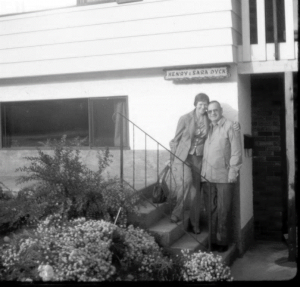
Henry felt bad because she had just had an operation for cancer and he was making her move, but Sally said that her making him stay in Leamington would be like Henry telling her not to have the operation.
When they moved to Kelowna, they had no kids with them, but the church was very friendly. Her niece’s husband, Victor Huebert (my grandpa), came to Kelowna for a visit with his daughter, Jodi, and called her asking where he should go for church and she told him their church. Once she hung up, she realized she hadn’t invited him to lunch. After church, she asked him but he said “Sorry, Aunt Sally, you’re too late, this lady has already asked me.”
Sally also went to college in Kelowna. She took an “Introduction to Computers” course for seniors, along with her neighbour.
After seventeen and a half years, Henry had a nose operation and was able to breathe better. He asked her when he died, would Sally like to continue living in Kelowna, or return to Leamington, and she said Leamington, because that’s where her son, Paul, and her siblings were, so in October of 1997, they returned to Leamington.
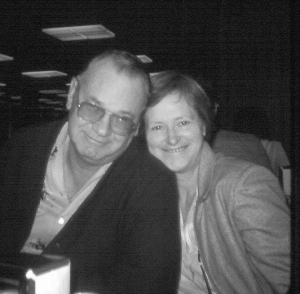
Sally called her sister, Susy, and she got her an apartment on the third floor of Susy’s apartment building. They weren’t there very long before they moved into a house on Bennie Street. They lived on Bennie Street until 1998 when Henry and his brother-in-law built a duplex on Hayward Street. They lived on Hayward Street until 2006, when Sally and Henry moved into the Gardens Apartments on Pickwick Drive.
On February 29, 2008, Henry passed away in the hospital due to another breathing condition. He was there three days when the nurse called Sally at quarter to four in the morning and told her to come to the hospital.
On the day of the funeral, they buried him in the morning and had the church service in the afternoon, which was how they did funerals in Kelowna, and Sally liked that. Henry was buried with the Dyck family: his three brothers and his mother and father. They buried him deeper, so that when Sally dies, she’ll be buried above him.
Sally and Henry had just celebrated their 60th wedding anniversary that February.
Of their six children, Susanne lives in Switzerland, Paul and Henry live around here, Jim lives in Windsor, Tim lives in Steinbach, Manitoba, and Peter lives in Ottawa. Sally has eighteen grandchildren, nine boys and nine girls, and sixteen great-grandchildren.
The three children who still live in the area take care of her. Henry is her financial advisor, Paul is her car advisor, and Jim is her computer helper. Henry visits on Mondays and Paul visits on Fridays.
Sally enjoyed being a mom. She loved children, and always wanted eight, but had six. It was hard financially, but she was used to that. Money wasn’t a problem and she worked with what they had.
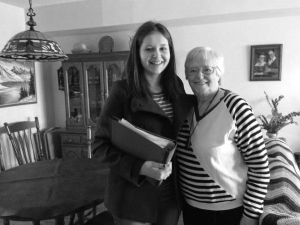
As we wrapped up our last meeting, my grandma asked Sally two questions: What was her biggest accomplishment and what has been the most important thing in her life? Sally answered that her biggest accomplishment was her kids and the most important thing in her life was Jesus. He had led her through raising six children, all of whom loved her and never left angry.
